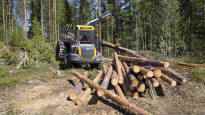The European Parliament would limit the felling of wood as renewable energy, but legislation is still a long way off.
The European Parliament made a decision on Wednesday that heated up feelings in Finland.
The Parliament voted that biomass obtained from the forest, i.e. trees, stumps or branches, would no longer be eligible for renewable energy support.
Interpretations of what this would lead to are tinged with conflicts of interest.
This is what the Parliament decided
The decision is related to the renewal of the renewable energy directive.
With the directive, the EU sets a target for the amount of renewable energy and guides the use of subsidy money. Since the tree grows, i.e. regenerates slowly, it has been unclear whether it is counted as renewable or not.
The Parliament reached a compromise, about which four points should be noted:
1. In emissions trading wood would continue to be counted as a zero-emission energy source. The exclusion of wood energy combustion from the emissions trading would still be a direct support for it.
2. The amount of wood energy burned in the years 2017–2022 would be the level that would still be counted as renewable energy. If the use of wood is increased, the increase would no longer count as renewable energy.
3. Parliament would remove subsidies for renewable energy from the trunk, stumps and branches. They could still be burned for energy, but in the future without the support of renewable energy.
4. The voting result is the Parliament’s position, not the final decision. In the final negotiations with the Commission and member states, everything can still change.
Contradictory reactions
In Finland, the air is thick with interpretations. Forestry representatives are worried and environmentalists praise.
– We are not against forestry, but overuse and the kind of industrial wood burning that has been proven to be harmful to the climate. That’s why ending subsidies would be a good thing here, says a conservation expert from the Finnish Nature Conservation Association Hanna Aho.
– Subsidies are not the problem, but the ceiling defined for the share of renewables. It could be exceeded in Finland when forest chips are used to replace coal and peat, says Bioenergia ry’s branch manager Hannes Tuohiniitty.
There is a tight torsion in the front.
– In a market economy, you usually have to manage without subsidies. But there are also threatening images here. Difficult sections will still be wringing their hands, says the MEP, who was the environmental committee’s chief negotiator in the case Nils Torvalds (r.).
Miapetra Kumpula-Natria (sd.), MEP Miapetra Kumpula-Natria (left), Metsäteollisuus ry’s head of EU forest affairs Maija Rantamäki, and Sampo Soimakallio, group manager of the Finnish Environment Institute, have also been interviewed for the story.
